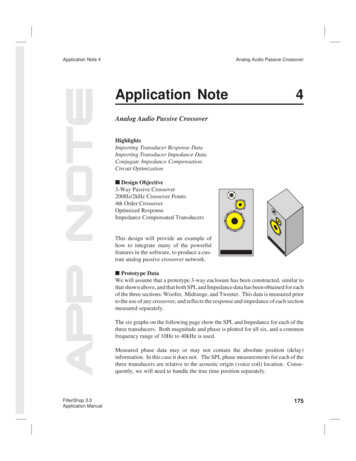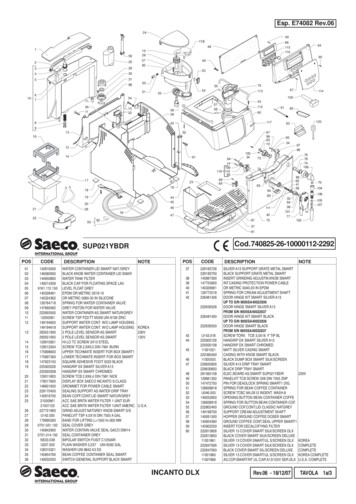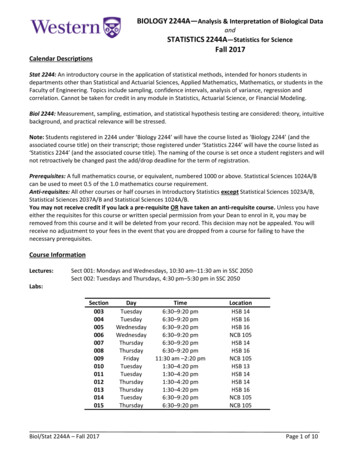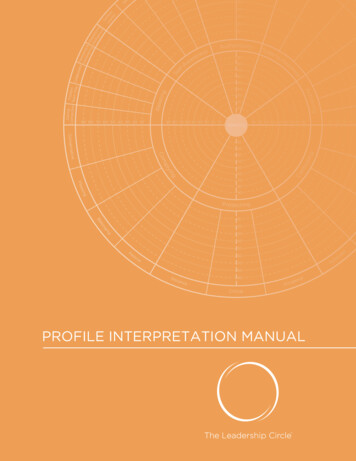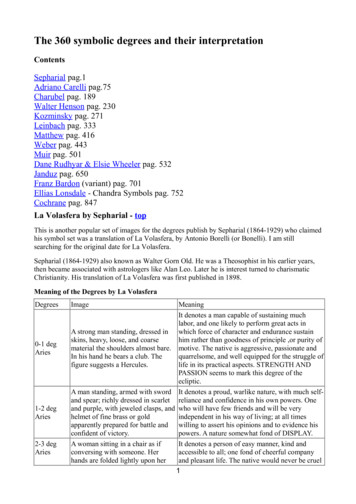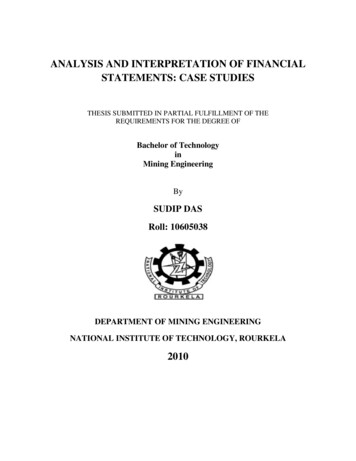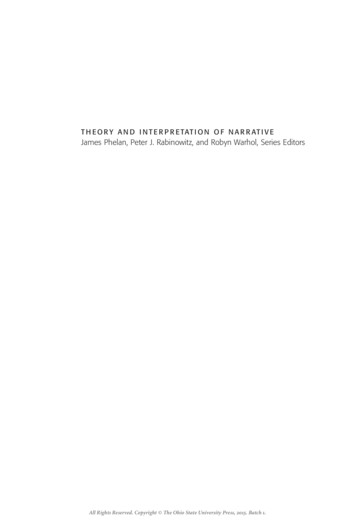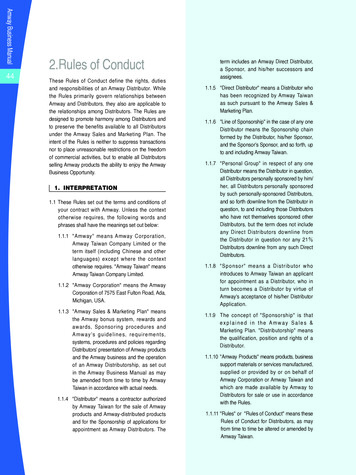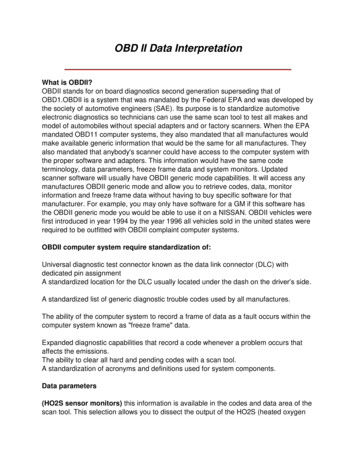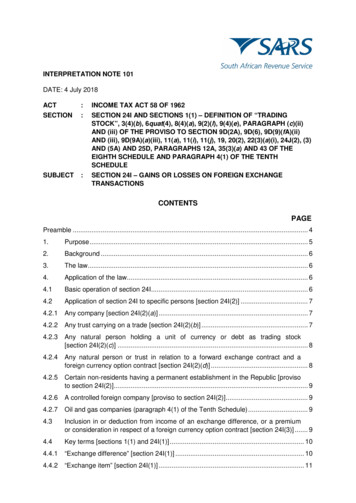
Transcription
INTERPRETATION NOTE 101DATE: 4 July 2018ACT:INCOME TAX ACT 58 OF 1962SECTION:SECTION 24I AND SECTIONS 1(1) – DEFINITION OF “TRADINGSTOCK”, 3(4)(b), 6quat(4), 8(4)(a), 9(2)(l), 9(4)(e), PARAGRAPH (c)(ii)AND (iii) OF THE PROVISO TO SECTION 9D(2A), 9D(6), 9D(9)(fA)(ii)AND (iii), 9D(9A)(a)(iii), 11(a), 11(i), 11(j), 19, 20(2), 22(3)(a)(i), 24J(2), (3)AND (5A) AND 25D, PARAGRAPHS 12A, 35(3)(a) AND 43 OF THEEIGHTH SCHEDULE AND PARAGRAPH 4(1) OF THE TENTHSCHEDULESUBJECT:SECTION 24I – GAINS OR LOSSES ON FOREIGN EXCHANGETRANSACTIONSCONTENTSPAGEPreamble . 41.Purpose . 52.Background . 63.The law. 64.Application of the law. 64.1Basic operation of section 24I. 64.2Application of section 24I to specific persons [section 24I(2)] . 74.2.1Any company [section 24I(2)(a)] . 74.2.2Any trust carrying on a trade [section 24I(2)(b)] . 74.2.3Any natural person holding a unit of currency or debt as trading stock[section 24I(2)(c)] . 84.2.4Any natural person or trust in relation to a forward exchange contract and aforeign currency option contract [section 24I(2)(d)] . 84.2.5Certain non-residents having a permanent establishment in the Republic [provisoto section 24I(2)]. 94.2.6A controlled foreign company [proviso to section 24I(2)]. 94.2.7Oil and gas companies (paragraph 4(1) of the Tenth Schedule) . 94.3Inclusion in or deduction from income of an exchange difference, or a premiumor consideration in respect of a foreign currency option contract [section 24I(3)] . 94.4Key terms [sections 1(1) and 24I(1)] . 104.4.1“Exchange difference” [section 24I(1)] . 104.4.2“Exchange item” [section 24I(1)] . 11
24.4.3“Local currency” and “foreign currency” [section 24I(1)] . 114.4.4“Functional currency” [section 1(1)] . 134.4.5“Transaction date” [section 24I(1)] . 144.4.6“Translate” [section 24I(1)]. 144.4.7“Realised” [section 24I(1)]. 144.4.8“Ruling exchange rate” [section 24I(1)] . 144.4.9“Spot rate” [section 1(1)] . 154.4.10 “Average exchange rate” [section 1(1)] . 194.5Application of section 24I(1) to (3) to specific exchange items . 194.5.1A unit of currency acquired and not disposed of by a person . 19(a)Transaction date and realisation date in relation to a unit of foreign currency . 19(b)Ruling exchange rate in relation to a unit of foreign currency. 204.5.2Debt in foreign currency incurred by or payable to a person . 21(a)Transaction date and realisation date in relation to a debt denominated in foreigncurrency owed by or to a person. 22(b)Ruling exchange rates in relation to debt . 23(c)Conversion of the foreign currency in which a debt is denominated. 29(d)Acquisition and disposal rates on acquisition and disposal of debt (proviso toparagraph (a) of the definition of “ruling exchange rate”) . 314.5.3A forward exchange contract . 36(a)Definition of “forward exchange contract” and “forward rate” . 36(b)Transaction date and realisation date for a forward exchange contract . 37(c)Ruling exchange rates in relation to a forward exchange contract . 37(d)Determination of a market-related forward rate on translation date of a forwardexchange contract . 37(e)A forward exchange contract that is an affected contract . 42(f)Alternative ruling exchange rate in relation to a forward exchange contract ontranslation date . 48(g)Early termination, extension or cancellation of a forward exchange contract . 494.5.4A foreign currency option contract . 52(a)Definition of “foreign currency option contract”. 52(b)Premium or like consideration received by or paid by a person under a foreigncurrency option contract or consideration paid for a foreign currency optioncontract . 53(c)Transaction date and realisation date in relation to a foreign currency optioncontract . 54(d)Ruling exchange rates in relation to a foreign currency option contract . 54(e)Definition of “market value” . 55(f)Definition of “intrinsic value”. 55(g)Definition of “option strike rate” . 56(h)Determination of an exchange difference in relation to a foreign currency optioncontract that is not an affected contract . 56
3(i)Determination of an exchange difference in relation to a foreign currency optioncontract that is an affected contract . 604.6Prohibition against double deductions or inclusions [section 24I(6)] . 624.7Exchange differences that arise before an asset is brought into use[section 24I(7)]. 624.7.1The general application of section 24I(7) . 624.7.2Apportionment of debt that funded various assets or expenses and related hedgecover . 674.7.3Exchange difference arising from debt that financed mining assets . 694.7.4Exchange differences arising from debt, a forward exchange contract and a“replacement” forward exchange contract subject to section 24I(7) . 724.8Anti-avoidance provisions [sections 24I(8) and 80A to 80L] . 744.9Deferral of exchange difference on a debt between companies forming part ofthe same group of companies and between connected persons[section 24I(10A)] . 764.10Deemed acquisition or disposal of an exchange item [section 24I(12)] . 824.11Determining foreign exchange gains and losses of controlled foreign companies[paragraphs (c)(ii) and (iii) of the proviso to section 9D(2A), section 9D(6),section 9D(9)(fA)(ii) and (iii) and section 9D(9A)(a)(iii)]. 854.11.1 The interaction between sections 9D and 24I . 854.11.2 Local and foreign currency of a controlled foreign company . 86(a)An exchange item of a controlled foreign company which is attributable to apermanent establishment in the Republic . 86(b)An exchange item of a controlled foreign company which is attributable to apermanent establishment outside South Africa . 87(c)An exchange item of a controlled foreign company which is not attributable to apermanent establishment in or outside South Africa . 884.11.3 Disregarding of foreign exchange gains or foreign exchange losses betweencontrolled foreign companies forming part of the same group of companies . 89(a)Exchange differences on exchange items between controlled foreign companieswhich are part of the same group of companies [paragraph (c)(ii) of the proviso tosection 9D(2A) and section 9D(9)(fA)(ii)] . 89(b)Foreign exchange difference on a forward exchange contract or a foreigncurrency option contract entered into to hedge an exchange item betweencontrolled foreign companies which are part of the same group of companies[paragraph (c)(iii) of the proviso to section 9D(2A) and section 9D(9)(fA)(iii)]]. 90(c)Exchange difference attributable to a foreign business establishment of acontrolled foreign company [section 9D(9A)(a)(iii)] . 924.11.4 Translation of a controlled foreign company’s exchange differences and netincome to rand [section 9D(6)] . 954.12Interaction between section 24I and sections 24J, 25D and paragraph 43 . 964.12.1 Determination of taxable income in foreign currency [section 25D] . 964.12.2 Assets disposed of or acquired in foreign currency [paragraph 43] . 98
44.12.3 Incurral and accrual of interest under section 24J and the determination ofexchange differences in relation to an interest-bearing debt under section 24I . 1034.13Trading stock [section 1(1) – definition of “trading stock” and section 22(3)(a)(i)] . 1114.13.1 Exclusion of a forward exchange contract and a foreign currency option contractfrom the definition of “trading stock” [paragraph (b) of the definition of “tradingstock” in section 1(1)] . 1114.13.2 Exclusion of an exchange difference from the cost price of trading stock[section 22(3)(a)(i)] . 1114.14Bad and doubtful debts and subsequent recoupment [sections 11(a), (i) and (j),8(4)(a) and 24I(4)] . 1134.14.1 Bad and doubtful debts [sections 11(i) and (j) and 24I(4)] . 1134.14.2 Recoupment of bad debts previously written off [section 8(4)(a)] . 1234.15Reduction of debt (section 19 and paragraph 12A) . 1294.16Assessed losses [section 20(2)] . 1314.17Source of foreign exchange gains and losses [section 9(2)(l) and 9(4)(e)]. 1314.18Translation of foreign taxes to rand and the determination of an exchangedifference on a foreign tax debt . 1324.18.1 Translation of foreign taxes to rand for purposes of section 6quat[section 6quat(4)] . 1324.18.2 Determination of an exchange difference on a foreign tax debt . 1324.19Objections and appeals [section 3(4)(b)] . 1345.Conclusion . 134Annexure A – The law . 137Annexure B – Index of common terms used in this Note and where to find anexplanation or definition . 155PreambleIn this Note unless the context indicates otherwise –1 “CGT” means capital gains tax, being the portion of normal tax attributable tothe inclusion in taxable income of a taxable capital gain; “paragraph” means a paragraph of the Eighth Schedule; “permanent establishment” means a permanent establishment as definedin section 1(1); 1 “R” means rand which is officially often referred to as ZAR; “realisation date” means the date an exchange item is realised; “Schedule” means a Schedule to the Act; “section” means a section of the Act; “the Act” means the Income Tax Act 58 of 1962;See Annexure A.
5 “translation date” means the last day of a year of assessment 2 on which anexchange item that has not yet been realised, is restated in local currency; “year 1”, “year 2”, “year 3”, “year 4” and “year 5” in any of the examplesrefer to calendar year 1, calendar year 2, calendar year 3, calendar year 4and calendar year 5 respectively; and any other word or expression bears the meaning ascribed to it in the Act.Annexure B contains an index of common terms used in this Note.All guides and interpretation notes referred to in this Note are available on the SARSwebsite at www.sars.gov.za. Unless indicated otherwise, the latest issue of thesedocuments should be consulted.1.PurposeThis Note provides guidance on the interpretation and application of section 24I.Section 24I 3 deals with the income tax treatment of foreign exchange gains andlosses on exchange items as well as premiums or like consideration received or paidin respect of FCOCs entered into and any consideration paid in respect of an FCOCacquired by certain persons.The tax treatment of transactions denominated in a foreign currency often requires aconsideration of section 24I and other provisions of the Act. This Note identifies someof the situations in which one or more of these provisions may apply. For example, iftrading stock, the purchase price of which is denominated in USD, is purchased oncredit from a supplier, the provisions of section 25D 4 and section 24I are relevant.The income tax treatment of virtual currencies (cryptocurrencies and noncryptocurrencies) is not considered in this Note.This Note withdraws and replaces Practice Note 4 “Income Tax: The Treatment ofGains and Losses on Foreign Exchange Transactions in terms of Section 24I of theIncome Tax Act, 1962 (the Act)”.This Note reflects the income tax and tax administration legislation (as amended) atthe time of publishing and includes the following:234 The Taxation Laws Amendment Act 17 of 2017 which was promulgated on18 December 2017 (as per Government Gazette 41342). The Tax Administration Laws Amendment Act 13 of 2017 which waspromulgated on 18 December 2017 (as per Government Gazette 41341). The Rates and Monetary Amounts and Amendment of Revenue Laws Act 14of 2017 which was promulgated on 14 December 2017 (as per GovernmentGazette 41323).See 4.4.6 for the impact of the approval of different accounting periods under section 66(13A)and (13C).Section 24I was inserted by section 21 of the Income Tax Act 113 of 1993 and applies to years ofassessment commencing on or after 1 January 1994.For more information on section 25D see Interpretation Note 63 “Rules for the Translation ofAmounts Measured in Foreign Currencies other than Exchange Differences Governed bySection 24I and the Eighth Schedule”.
62.BackgroundSection 24I governs the income tax treatment of foreign exchange gains and losseson exchange items as well as premiums or like consideration received or paid inrespect of FCOCs entered into and any consideration paid in respect of an FCOCacquired by specified persons.Although the application of the section is limited to those persons listed insection 24I(2), the ambit of section 24I(2) is wide which results in the section beingapplicable to a large number of persons and transactions.Under section 24I, exchange differences calculated for a year of assessment aregenerally included in or deducted from income whether realised or not and whetherof a capital or revenue nature. The legislation was drafted in this manner in line withthe view that gains and losses on foreign exchange transactions largely representfinance charges and as a result must be brought to account on a revenue basis fortax purposes at the end of a year of assessment even if not realised.There are limited circumstances in which the inclusion of a foreign exchange gain orloss calculated in respect of an exchange item in a particular year of assessment isdeferred and recognised in a later year of assessment.3.The lawThe relevant legislation is quoted in Annexure A.4.Application of the law4.1Basic operation of section 24ISection 24I(2) identifies the persons to whom section 24I applies and section 24I(3)determines which exchange differences (foreign exchange gains and losses) andpremiums or like consideration on FCOCs entered into or consideration on FCOCsacquired are included in 5 or deducted from 6 income.An exchange difference is determined on each exchange item for the year ofassessment in which such exchange item arose, as well as every subsequent year ofassessment until and including the year of assessment in which it is realised. Tocalculate an exchange difference for a specific year of assessment, acommencement date and a final date must be established in that year ofassessment. The following combinations of commencement dates and final dates arepossible:567 Transaction date and realisation date. Transaction date and translation date (last day of the year of assessment). 7 The previous translation date (last day of the previous year of assessment)and realisation date.Foreign exchange gains and premiums or like consideration on FCOCs are included in grossincome under paragraph (n) of the definition of “gross income” in section 1(1).Foreign exchange losses, premiums or like consideration on FCOCs entered into andconsideration on FCOCs acquired are deducted from income under section 11(x).See 4.4.6 for the impact of the approval of different accounting periods under section 66(13A)and (13C).
7 The previous translation date (last day of the previous year of assessment)and the current translation date (last day of the current year of assessment).The exchange difference on a particular exchange item for a specific year ofassessment is determined by multiplying the foreign currency amount of theexchange item by the difference between the ruling exchange rate on thecommencement date in that year of assessment and the ruling exchange rate on thefinal date in that year of assessment. An exchange difference calculated in thismanner represents the effect of the weakening or strengthening of the relevantexchange rate over the period between the two dates and will be reflected as aforeign exchange gain or loss. This foreign exchange gain or loss is equal to theincrease or decrease in the rand value of the exchange item because of movementsin the relevant exchange rate. For example, when a person contemplated insection 24I(2) owes an amount in a foreign currency to another person and the randstrengthens against the foreign currency, that person will make a foreign exchangegain. Should the rand weaken against the foreign currency, the person will incur aforeign exchange loss.The definitions which are relevant to the application of section 24I are primarily foundin section 24I(1). However, some definitions are contained in section 1(1). Six keydefinitions in section 24I(1) are “exchange difference”, “exchange item”, “transactiondate", "realised", “translated" and "ruling exchange rate". These definitions andvarious other terms are discussed later in this Note.4.2Application of section 24I to specific persons [section 24I(2)]Section 24I applies to the persons discussed in 4.2.1 to 4.2.6.Although the persons referred to in 4.2.1 to 4.2.4 could be residents or non-residents,the proviso to section 24I(2) further restricts the application of section 24I to personsfalling within 4.2.1 to 4.2.4 who are residents, CFCs (controlled foreign companies) ornon-residents to the extent the exchange items included in 4.2.1 to 4.2.4 areattributable to that non-resident’s permanent establishment in South Africa.Section 24I is relevant in the context of CFCs when the inclusion of a portion of aCFC’s net income in a qualifying resident’s income is required under section 9D(2)and the CFC’s net income is calculated under section 9D(2A) (see 4.11.1).4.2.1Any company [section 24I(2)(a)]Section 24I applies to any company 8 irrespective of whether it carries on a trade.See 4.2.7 for special rules that apply when determining exchange differences of oiland gas companies.4.2.2Any trust carrying on a trade [section 24I(2)(b)]Section 24I applies to any trust carrying on any trade. The section is applicable to atrust which traded throughout the year of assessment and a trust which commencedtrading or ceased trading during the year of assessment. 989See the definition of “company” in section 1(1).See 4.10.
8If a trust carries on a trade, section 24I applies to the trust as a whole which means itapplies to all of the trust’s exchange items and relevant premiums or consideration inrespect of FCOCs (see 4.3) even if related to non-trade activities carried on by thetrust.The term “trade” is defined in section 1(1). In Burgess v CIR 10 the court held that it iswell-established that the definition of trade should be given a wide interpretation.The words “carrying on any trade” are not defined in the Act. Whether a person, andin this case a trust, is carrying on a trade is a question of law that must be decided onthe facts of each case. 11Section 24I applies also to a trust which is not carrying on a trade in thecircumstances discussed in section 24I(2)(d) (see 4.2.4).4.2.3Any natural person holding a unit of currency or debt as trading stock[section 24I(2)(c)]Section 24I applies to any natural person holding a unit of foreign currency or a debtdenominated in foreign currency as trading stock. If a natural person holds a singleunit of foreign currency or a debt denominated in foreign currency as trading stock,section 24I(2)(c) has the effect that section 24I applies to all exchange items held bythat natural person and, read with section 24I(3), means that exchange differenceson all the exchange items held by that person must, as appropriate, be included in ordeducted from income. For example, if a natural person holds dollars as tradingstock, a dollar denominated debt as a capital asset and an FEC (forward exchangecontract), section 24I will apply to the units of foreign currency, the debt denominatedin foreign currency and the FEC.Section 24I(12) deals with the deemed acquisition and deemed realisation ofexchange items on hand when section 24I becomes or ceases to be applicable to,amongst others, a natural person (see 4.10).Section 24I also applies to a natural person in the circumstances mentioned insection 24I(2)(d) (see 4.2.4).4.2.4Any natural person or trust in relation to a forward exchange contract and aforeign currency option contract [section 24I(2)(d)]Section 24I applies to any natural person or trust in respect of any amount in foreigncurrency – owed by or to that person on an FEC; or if that person has the right or contingent obligation to buy or sell that amountunder an FCOC (foreign currency option contract).Under section 24I(2)(d), section 24I applies to FECs and FCOCs held by naturalpersons or trusts but does not apply to any units of foreign currency and foreigncurrency-denominated debt owed by or to that natural person or trust. See 4.2.2 and10111993 (4) SA 161 (A), 55 SATC 185 at 196.CIR v Stott 1928 AD 252, 3 SATC 253; Platt v CIR 1922 AD 42, 32 SATC 142 and COT vBooysens Estates Ltd 1918 AD 576, 32 SATC 10. See also Interpretation Note 33 “Assessedlosses: Companies: The ‘Trade’ and ‘Income from Trade’ Requirements” for a discussion of thetrade requirement.
94.2.3 which deal with circumstances in which all the exchange items, including unitsof foreign currency and foreign currency denominated debt, held by trusts and naturalpersons are subject to section 24I.4.2.5Certain non-residents having a permanent establishment in the Republic[proviso to section 24I(2)]The proviso to section 24I(2) provides that section 24I does not apply to an exchangeitem of a person listed in 4.2.1 to 4.2.4 that is not a resident (other than a CFC),unless that exchange item is attributable to a permanent establishment of that personin the Republic.4.2.6A controlled foreign company [proviso to section 24I(2)]Section 24I applies to exchange items of a CFC. Section 24I is applied in calculatingthe net income of a CFC 12 which must be included in the income of qualifyingpersons that are residents 13 (see 4.11.1).4.2.7Oil and gas companies (paragraph 4(1) of the Tenth Schedule)Special rules apply in determining exchange differences of oil and gas companies. 14Currency gains or losses of an oil and gas company during any year of assessment(regardless of whether those gains or losses are realised or unrealised) must bedetermined solely with reference to –4.3 the functional currency of that company; and the translation method used by that company for purposes of financialreporting.Inclusion in or deduction from income of an exchange difference, or a premiumor consideration in respect of a foreign currency option contract[section 24I(3)]The following amounts must be included in or deducted from the income of anyperson referred to in section 24I(2) (see 4.2):121314151617 Subject to section 24I(7) 15 and section 24I(10A), 16 any exchange differenceon an exchange item of or in relation to that person [section 24I(3)(a)]. Subject to section 24I(7), 17 any premium or like consideration received by orpaid by that person under an FCOC entered into by that person[section 24I(3)(b)(i)].Section 9D(2A).Section 9D(2).The term “oil and gas company” is defined in paragraph 1 of the Tenth Schedule.See 4.7 for a discussion of section 24I(7) which deals with exchange differences linked tospecified assets that arise before the asset is brought into use.See 4.9 for a discussion of section 24I(10A) which deals with certain exchange differences arisingbetween companies forming part of the same group of companies and between connectedpersons.See 4.7 for a discussion of section 24I(7) which deals with exchange differences linked tospecified assets that arise before the asset is brought into use.
10 Subject to section 24I(7), 18 any consideration paid for an FCOC acquired bythat person from another person [section 24I(3)(b)(ii)].An exchange difference must be calculated on each exchange item. For example,when trading stock is purchased on credit in foreign currency and the taxpayer entersinto an FEC to hedge the debt, exchange differences must be calculated on twoexchange items, namely, the debt and the FEC.4.4Key terms [sections 1(1) and 24I(1)]4.4.1“Exchange difference” [section 24I(1)]An exchange difference is calculated on translation date and realisation date.The term “exchange difference” means the foreign exchange gain or foreignexchange loss on an exchange item during any year of assessment determined bymultiplying such exchange item by the difference between – the ruling exchange rate on transaction date in respect of such exchange itemduring that year of assessment, and – the ruling exchange rate on realisation date when the exchange itemis realised during that year of assessment; or the ruling exchange rate on translation date when the exchange itemis not realised during that year of assessment; or the ruling exchange rate at which such exchange item was translated at theend of the immediately preceding year of assessment or at which it wouldhave been translated had this section been applicable at the end of thatimmediately preceding year of assessment, and – the ruling exchange rate on realisation date when the exchange itemis realised during that year of assessment; or the ruling exchange rate
trading stock, the purchase price of which is denominated in USD, is purchased on credit from a supplier, the provisions of section 25D. 4. and section 24I are relevant. The income tax treatment of virtual currencies (cryptocurrencies

